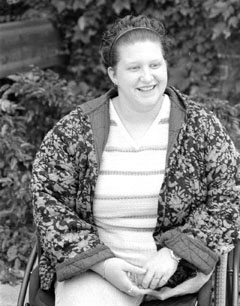The University Record, October 11, 1999 By Rebecca A. Doyle

Erica Mitchell wheels her way to some of her classes on campus, but is happy that she often has classes in East Quad’s Residential College.
Mitchell, a first-year student from Otsego, is one of many at the U-M who need to think ahead about how to tackle their classes, work, recreation and social life. She lost a leg last year, when she was scheduled to begin her college career, and had to postpone her entry to the U-M while she endured an amputation and chemotherapy.
“The most helpful service the Office of Services for Students with Disabilities offers is the campus accessibility map that’s available online,” she says. “I almost always consult this before going anywhere so I can know what to expect.” Mitchell also says she has chosen her classes carefully so that she has time to get from one to the next, and she is happy to live in a residence hall so close to work and shopping.
“I’ve been waiting awhile for this. I’m so excited to be back in school that the 10-minute trip to classes really isn’t inconvenient,” she says. Although she has not decided on a major field of study, she has really enjoyed history of art classes.
Not all students have disabilities that are as visible as Mitchell’s, however. The University’s Office of Services for Students with Disabilities also assists those who have invisible disabilities. Learning disabilities, including attention deficit (ADD) and attention deficit hyperactivity disorder (ADHD) present real hurdles to students, who must work extra hard to filter out all the distractions that surround them in large lecture halls and who must work harder than they ever have to focus on studies and lectures.
Students with ADD and ADHD not only have to battle their disability, they also have to combat general misunderstanding about themselves. People who have ADD and ADHD have been labeled lazy, unmotivated, disorganized, sullen and uncaring.
One student who talked to the Record asked that his name not be used, but described his life as a senior with a double major in music and pre-medicine as “a struggle all the time to stay on top of things.”
“You do what you have to do,” he says. “You can’t make excuses for yourself any more; you just have to do it.”
He says that he takes medication, which helps some, but he “loses track of things easily. I have to write things down all the time. And with the fast pace required in most of the classes, it is really hard to take all the notes you need to.”
The Office of Services for Students with Disabilities offers help with note-taking, and can intervene if a faculty member objects to having a student use a tape recorder. But for students with ADHD, even the tape recorder is not much help, especially in advanced and technical courses. “It’s like having to sit through class twice in the same day—and that is something you just don’t have time for.”
In addition to his 18-credit-hour load, this music/pre-medicine major works a 25-hour week, and says that because of his career choice, he will be spending one more year at the U-M.
To other ADHD students, he would say, “You can do it. It takes planning and time, and you must be the one to seek out the help you need, not only from the services at the University, but from everybody, including faculty.”
And to those faculty, especially, he would say, “Sometimes you need to be more receptive to the needs of some students. It’s important to understand that students like me can lose track of things easily, forget to do things they know they must do, miss meetings and lose track of conversations and lectures in the middle of them.”
He does appreciate the anonymity of note-taking that is sometimes provided in classes if he requests it. Confidentiality is extremely important to him so that “people won’t see me as someone different from them.”
Stuart Segal, who is coordinator of services for students with learning disabilities, says there are approximately 325 students on campus who have met the University’s criteria for disabilities that can be accommodated at the U-M. He agrees that it is important for students to ask for services they think they need, though he cautions that testing and documentation is required before services can be offered.
“Our emphasis here is one of self-advocacy. We are a non-intrusive, non-invasive office,” Segal says. “We do whatever we can to help students, to provide them with an equal opportunity to demonstrate what they know.”
The most common requests, Segal says, are those for extended time on tests and examinations, less distracting environments for student testing, note-taking assistance, using a laptop to take essay exams and using a spellchecker or calculator for in-class assignments.
The transition to a university from high school can be especially difficult, Segal notes. Students in high schools may have had more individualized attention from teachers than is possible in a university setting.
But, he says, at the U-M, many students with learning disabilities are learning to cope with the environment. The graduation rate for students with learning disabilities is 80 percent and the average grade point average is 3.0.
This year’s “Investing in Abilities Week” activities include:
For more information, call 763-0235 or 647-1388 (TTY) or visit the Web at www.umich.edu/~hraa/ability.

